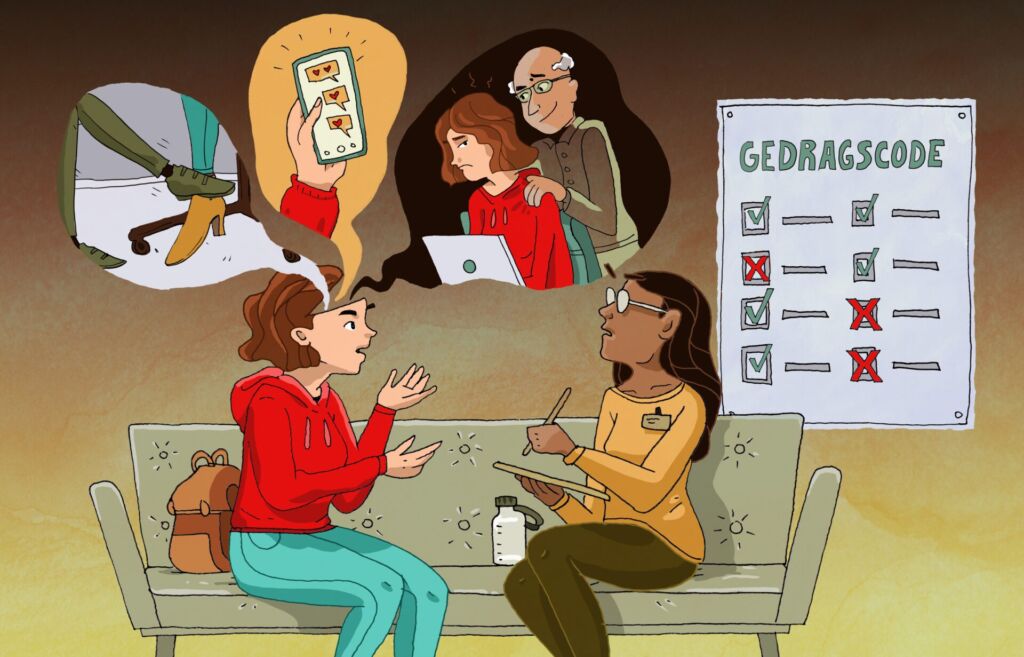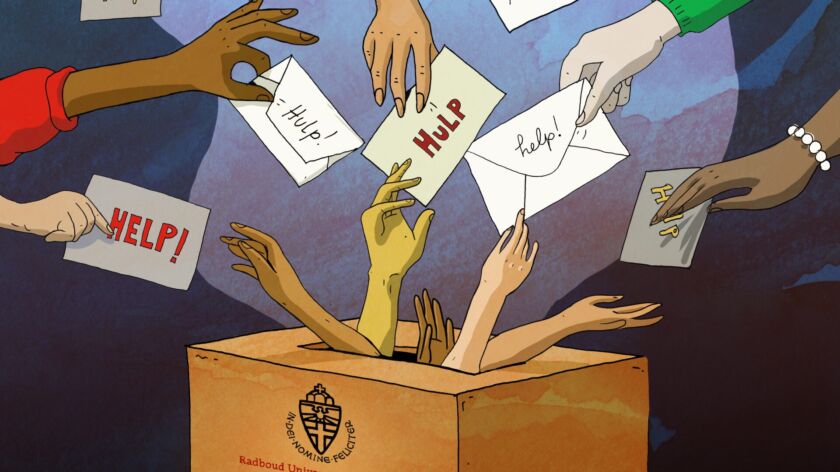How is it going with the plan to address undesirable behaviour on campus?
Exit interviews, a code of conduct and a hotline for students and staff. These are some of the components of Prevent Care Cure, the plan for improving social safety on campus. But what is the status of the plan announced a year and a half ago? An overview in five questions and answers.
How is it going with the implementation of the plan across the campus?
‘Very well,’ says Frank van de Wolde, consultant at Boer & Croon, who acts as PCC’s Project Manager – the entire project team consists of eight employees. ‘Some subprojects have already been completed. For example, we completed the evaluation of the complaints procedure, which turned out to basically work well, although it could be made even more accessible to complainants. All the recommendations from that evaluation have been adopted.’
In addition, since August, employees leaving the University are automatically sent a survey on topics such as social safety, diversity, and working conditions. ‘The answers are anonymous, but by analysing patterns, we can adjust policy where necessary,’ explains Van de Wolde.
Departing employees are also as a standard given the option of an exit interview, no longer only with an HR advisor from their own faculty or division, but also, if desired, with an HR employee who is further removed. ‘Especially in situations involving social safety, this can have crucial added value.’ Departing employees are also asked whether they need coaching, for example as support for their next career step.
Another completed project is the reflection on the Code for Good Governance at Universities. ‘We talked about it with Deans, the Supervisory Board, the Executive Board, and the Administrative Directors,’ says Van de Wolde. ‘We intend to repeat these conversations annually so that the dialogue around what constitutes good governance has a structural place within the organisation.’
What are the main aspects that still need to be realised?
Two things: a central hotline for students and staff, and a code of conduct for students. The latter will be largely in line with the code of conduct for employees, which has been in place for some time. But the two codes do have a different status, says Van de Wolde. ‘Employees fall under labour law, students under education law. That makes the documents slightly different in content and legal terms.’
‘The student code, which we are currently working on, came about with a lot of input from students through focus groups, as well as from confidential advisors,’ adds Ilja Hijink, Strategic Policy Advisor for Social Safety at Radboud University. ‘The code defines what is considered desirable and undesirable behaviour – for example when it comes to the role of mentors during orientation week – and should provide practical guidance.’
‘I think one of the great aspects of the plan is that it is also about how we do want to interact with each other and how we can support each other in the process,’ says senior lecturer in Strategic Human Resource Management Marloes van Engen, who is part of the PCC steering group as a researcher. ‘A key principle is that as people, we are allowed to make mistakes – within certain limits and as long as we learn from them.’

The intention is to discuss the student code with the University Student Council before the end of this academic year, so that it can enter into force starting in September.
The code of conduct for students will be available on Radboud University’s website and it will be communicated to students through posts on Instagram and in the newsletter, among others. Attention will also be devoted to the code of conduct during orientation week. The document does not need to be signed, nor is it legal in nature. The code of conduct is primarily meant to be a conversation starter, not a list of rules and measures.
What is the status of the central hotline for students and staff who have been the victim of undesirable behaviour?
If all goes according to plan, the hotline will launch in early 2026. We have now finalised the recruitment profile for an integrity officer, who will play a key role in the hotline. When a report comes in, it will be up to this person to decide which follow-up step is most appropriate. ‘Sometimes a confidential advisor is the right entry point, but there may also be a serious incident or pattern that requires further investigation,’ Van de Wolde explains. ‘One also needs to consider whether the issue touches on scientific or organisational integrity.’
The hotline should provide an easily accessible and informal way to raise concerns so that they can be addressed as early as possible. ‘Ideally, problems should be resolved informally in conversation, possibly with the support of the confidential advisors,’ says Hijink. ‘If that fails, a formal approach can be applied. The Advice and Report Point is responsible for organising expertise around a case and provide advice on follow-up steps.’
At the same time, existing confidential advisors and ombudspersons will remain directly available. ‘The hotline is a complementary service, not a replacement,’ Van de Wolde stresses.
Prevent Care Cure
In the autumn of 2023, the then Executive Board of Radboud University promised to come up with a plan to improve social safety on campus.
This was prompted by several incidents of transgressive behaviour which led to the University appearing in the news at the time. In September 2023, radio programme Argos revealed that a Psychology professor had been guilty of transgressive behaviour towards a student for three years. Shortly afterwards, Han van Krieken stepped down early as Rector Magnificus, after a university complaints committee conclude that he had made two comments to an employee that could potentially be perceived as sexual harassment. In December of the same year, the plan was launched under the name Prevent Care Cure (PCC).
Marloes van Engen emphasises that early intervention is crucial. ‘The sooner you act, the more likely it is that a solution can be found without escalation. If people find it difficult to discuss a problem, a confidential advisor can guide them, and if needed support them in a conversation.’
What is currently lacking, and what the hotline will hopefully improve, is structural follow-up on reports. ‘It still happens too often that a report is taken up, but there is no monitoring or evaluation afterwards,’ says Van de Wolde. ‘We want to actively follow up: does the reporter feel they have received the help they needed? Has the situation improved? If not, we can still scale up.’
A new follow-up policy should clarify how the University deals with reports of transgressive behaviour and the consequences of certain behaviour. ‘This provides HR and employees with guidance: what happens if someone crosses the line?’ says Van de Wolde. Hijink adds: ‘We base ourselves on the guidelines of Government Commissioner Mariëtte Hamer. Transparency is the key word. No one should feel that reports disappear into a black box.’
Will the plan be jeopardised by the budget cuts to higher education?
According to Project Manager Van de Wolde, in a way, the budgets cuts only reinforce the importance of the project. ‘You notice that there is extra tension at the University.’
The project team’s budget has not been reduced. ‘But if the entire organisation has to focus on finances, there will of course be less room for big plans,’ says Van de Wolde.
‘As a university, you want to communicate that you are working on social safety’
Without social safety, you are shooting yourself in the foot, adds Van Engen. ‘It affects people’s wellbeing. Without wellbeing, the primary process of a university – teaching, research and impact – cannot function properly. Moreover, as a university, you want to communicate that you are working on social safety.’
Ilja Hijink refers to a Royal Netherlands Academy of Arts and Sciences (KNAW) report on social safety in academia, which states that the costs for universities could rise if new cases of lack of social safety emerge. ‘If we implement our projects well, we will even be able to make savings, as issues such as dropout, sickness absence, and reduced productivity will decrease.’
There was recently a commotion at the Faculty of Law in response to the Executive Board’s decision to appoint a controversial interim dean. Doesn’t this kind of thing undo all your efforts?
‘It is not our role to go into specific case histories,’ says Van de Wolde. ‘But we did always indicate in our project plan that we take such situations into account.’
Hijink: ‘What is important to us is that we do not work in an ivory tower. We are really trying to understand what is going on on campus. Our goal is to design the projects to anticipate such issues in the future. It will never be perfect, but we do try to learn from these situations.’




